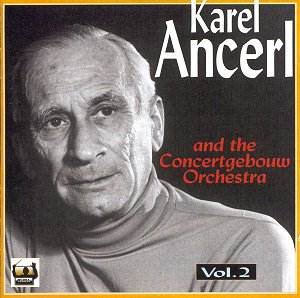The performances on this Tahra single CD were recorded
a week apart by NPS Radio in January 1970, three years before Ancerl’s
premature death at the age of sixty-five. Tahra 124-125 has many more
Ancerl-Concertgebouw performances but this one concentrates on Ancerl
the accompanist, partnering the Concertgebouw’s long standing leader,
Hermann Krebbers, in the Beethoven Concerto and Daniel Wayenberg in
the Rachmaninov Paganini Variations.
Surviving Ancerl-Beethoven material is patchy. He did
accompany Josef Palenicek in the Fourth Piano Concerto and his symphonies
One and Five have survived but little else. Krebbers, who was later
to record the Concerto with Haitink in 1973, joins with Ancerl in a
big-boned, weighty performance. The opening movement gets off to a sonorous
start with the Concertgebouw’s famed basses hewing their material as
if from coal. The sturdy, slow introduction – with the inner part writing’s
scampering figures more than ever audible at the slow tempo – leads
on to Krebber’s tightly focused playing. His vibrato is tight and despite
his occasional metrical dalliances his is, if one has to distinguish
characteristics in this way, an essentially feminine disquisition of
the first movement’s solo line. He vests the music with frequently lyrical
meaning – and his slowings down mean that there is a degree of sagging,
which to my ears sounds ponderous. I admired the rich blanket Ancerl
provides for Krebbers at these moments and the soloist’s exemplary quick
portamenti and rhythmic daring. In principle I also admire the anti-motoric
and intensifyingly vibrant playing, especially in Krebbers’ lower two
strings. But I was never entirely able to reconcile this rather fracturing
impress with the skeleton of the music – and at over twenty-five minutes
they are really very slow, an impression not gained by clock watching
alone. Krebbers’ attractively flute-like tone in the upper strings is
frequently delightful but again as he launches into a very slow cadenza
I wondered about the structural fidelity the movement demands. In the
slow movement they manage to convey an impression of deliberate tempo
but in fact manage to sustain it well; there is also some cultivated
playing from the orchestral principals and, no less, from the soloist
himself. Those deep burnished basses return for a finale that manages
to be brisk and characterful, forward moving and yet full of divisional
clarity. I enjoyed these two movements rather more than the first though
it’s always challenging to hear musicians plough their own furrow, not
least in this of all works.
After which the Rachmaninov comes, if not as an anti-climax
at least as a sane and trouble free performance - comparatively speaking.
Born in Paris in 1929 of Dutch parentage Wayenberg studied there with
Marguerite Long. He is a sensitive and intelligent musician with a technique
to match and this is a sane and extreme-free performance. Ancerl’s Rachmaninov
is thin on the ground and this is therefore a welcome survival; added
to which he was always a watchful and characterful accompanist and if
one wants an example of lucidity and restraint then this is an example
of them both.
Tahra’s determination to explore the radio archives
to exhume and promote Ancerl’s work is bearing rich fruit. The recordings
themselves sound well and I enjoyed the occasional idiosyncrasies of
this well-filled disc.
Jonathan Woolf


